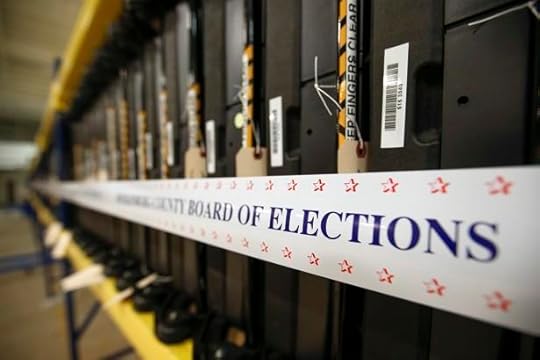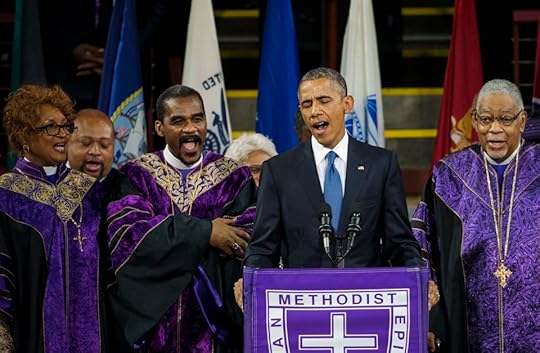Atlantic Monthly Contributors's Blog, page 111
July 29, 2016
North Carolina's Deliberate Disenfranchisement of Black Voters

DURHAM, N.C.—The Fourth Circuit Court of Appeals struck down key portions of North Carolina’s strict 2013 voting law on Friday, delivering a stern rebuke to the state’s Republican General Assembly and Governor Pat McCrory. The three-judge panel in Richmond, Virginia, concluded that the law was racially discriminatory, and it blocked a requirement that voters show photo identification to vote and restored same-day voter registration, a week of early voting, pre-registration for teenagers, and out-of-precinct voting.
“Faced with this record, we can only conclude that the North Carolina General Assembly enacted the challenged provisions of the law with discriminatory intent,” wrote Judge Diana Gribbon Motz. “Accordingly, we reverse the judgment of the district court to the contrary and remand with instructions to enjoin the challenged provisions of the law.”
North Carolina’s law, often described as the strictest in the nation, passed shortly after the Supreme Court struck down Section 5 the Voting Rights Act in Shelby County v. Holder. That section required states with a history of voter discrimination to “preclear” any changes to voting laws with the U.S. Department of Justice. Freed from that requirement, the General Assembly passed a slate of changes, including the photo-ID requirement. Both sides effectively agreed that these changes disproportionately affected poor, elderly, and African American voters, who were less likely to hold the required forms of photo ID, more likely to move frequently, and more likely to take advantage of early voting. These voters also vote overwhelmingly Democratic.
“In North Carolina, restriction of voting mechanisms and procedures that most heavily affect African Americans will predictably redound to the benefit of one political party and to the disadvantage of the other,” Motz wrote. “As the evidence in the record makes clear, that is what happened here.”
A range of plaintiffs, including the North Carolina NAACP, the Advancement Project, and the Department of Justice quickly sued the state over the law. In April, federal district-court Judge Thomas Schroeder upheld the law, finding that plaintiffs had “failed to show that such disparities will have materially adverse effects on the ability of minority voters to cast a ballot and effectively exercise the electoral franchise.”
Echoing Chief Justice John Roberts’s opinion in Shelby County, Schroeder stated that while the Old North State had a shameful history of racial discrimination, it was just that—history. “There is significant, shameful past discrimination. In North Carolina's recent history, however, certainly for the last quarter century, there is little official discrimination to consider,” he wrote.
The circuit court rebuked Schroeder, saying that the district court had “fundamentally erred” and “seems to have missed the forest in carefully surveying the many trees.” For example, Friday’s decision noted, black participation in elections had been rising steadily in the year before the law passed, periodically bolstered by federal intervention. “Not coincidentally, during this period North Carolina emerged as a swing state in national elections,” Motz drily noted. She also wrote:
The General Assembly enacted [these changes] in the immediate aftermath of unprecedented African American voter participation in a state with a troubled racial history and racially polarized voting. The district court clearly erred in ignoring or dismissing this historical background evidence, all of which supports a finding of discriminatory intent.
In 2008, Barack Obama narrowly won North Carolina in the presidential election. But in 2010, Republicans captured both houses of the legislature, and two years later McCrory defeated Governor Walter Dalton, as Mitt Romney edged Obama. The GOP undertook a program of conservative reforms, overturning a tradition of bipartisan moderation in the state. Among those changes was the voting law. While a bill had been under consideration, the Shelby County decision led state Senator Tom Apodaca to comment, “Now we can go with the full bill.” Though commonly referred to as a voter-ID law, similar to those passed or considered in other states, many advocates saw the other provisions as equally or more important.
In the end, it was Schroeder’s lengthy work on the case—a nearly 500-page opinion, plus 25,000 pages of record—that seemed decisive in the circuit-court decision. The panel of judges ruled that there was so much information in the record that they did not need to remand the case to the district court, and could determine that Schroeder made an erroneous factual finding on their own.
For example, the circuit-court decision makes much of the fact that legislators requested relevant data before passing the bill.
“Before enacting that law, the legislature requested data on the use, by race, of a number of voting practices. Upon receipt of the race data, the General Assembly enacted legislation that restricted voting and registration in five different ways, all of which disproportionately affected African Americans,” Motz wrote. “Although the new provisions target African Americans with almost surgical precision, they constitute inapt remedies for the problems assertedly justifying them and, in fact, impose cures for problems that did not exist.”
For example, the voter-ID law was both “too restrictive and not restrictive enough.” The circuit court found that the law harmed African American participation, but did little to combat fraud, the stated purpose, because fraud was more common in mail-in absentee voting, which was not affected.
The decision is a huge win for civil-rights advocates, who have argued in cases around the nation that voter-ID laws and other similar truncations are fighting a problem that does not exist—there is minimal evidence of voting fraud, despite insistence that such laws are essential to maintaining the sanctity of the vote—and are in fact designed to limit turnout among traditionally Democratic voters, and therefore help elect Republicans. (On occasion, voter-ID advocates trip up and say the same publicly.)
Because North Carolina’s law was among the nation’s most sweeping, and because it came so quickly after Shelby County, it has been watched as a bellwether for voting-rights cases nationwide. A favorable outcome for the state would likely embolden other conservative states to undertake similar overhauls, while a negative one would force them to take another tack, and encourage voting advocates.
Plaintiffs always expected to have a tougher hearing from Schroeder, a George W. Bush appointee, than from the Fourth Circuit, which is stocked with Obama appointees. Motz was appointed by Bill Clinton, while the other two judges on the panel, James Wynn Jr. and Henry Floyd, are Obama appointees. Many voting-law experts expect the final decision in the case to be rendered by the Supreme Court. The state is likely to appeal the decision. While the justices would be unlikely to render a decision before the November election, the state could request an injunction to keep the law in place as is.
If the law is not in effect in November, it could have a major impact. McCrory is locked in a tight reelection race against Democrat Roy Cooper. Senator Richard Burr is expected to face a tight battle to hold his seat against Democrat Deborah Ross. And Hillary Clinton’s campaign has targeted the Old North State as a key swing state, hoping that a win here would block any path to victory for Donald Trump.

Chelsea Clinton's Apt Wrinkle in Time Shout-Out

Chelsea Clinton has lived an unusual life, but the stories she shared in her speech at the Democratic National Convention Thursday night were meant to make her, and her parents, seem more ordinary. Pop culture helped in that effort. She spoke of Hillary reading Goodnight Moon to Chelsea and Chugga Chugga Choo Choo to Chelsea’s daughter. She referenced Bill binge-watching Police Academy with her. And she brought up a classic science-fiction novel:
I remember one week talking incessantly about a book that had captured my imagination, A Wrinkle in Time. Only after my parents had listened to me would they then talk about what they were working on, education, healthcare, what was consuming their days and keeping them up at night.
It is quite, yes, ordinary that teenage Chelsea might have been smitten with Madeleine L’Engle’s 1963 book, a young-adult fiction touchstone. But it’s possible to read greater significance into the mention of this particular young-adult-fiction touchstone on the night when her mother became the first female major-party presidential candidate.
“Bookish girls tend to mark phases of their lives by periods of intense literary character identification,” wrote Pamela Paul in a 2012 New York Times column. “For those who came of age any time during the past half-century, the most startling transformation occurred upon reading Madeleine L’Engle’s Newbery Medal-winning classic, A Wrinkle in Time. … It was under L’Engle’s influence that we willed ourselves to be like Meg Murry, the awkward girl who suffered through flyaway hair, braces, and glasses but who was also and to a much greater degree concerned with the extent of her own intelligence, the whereabouts of her missing scientist father, the looming threat of conformity and, ultimately, the fate of the universe.”
The parallels between Meg Murry and adolescent Chelsea Clinton are obvious from that quote alone, right down to the description of braces and unruly hair. As Lindsay Lowe noted for The Atlantic in 2013, Meg is an introverted, brainy heroine rather than a spunky, hotheaded one, a distinction that likely appeals to both Clinton women. And Meg, like Chelsea, is the daughter of two very high-powered parents—a spacetime-hopping astrophysicist dad and a microbiologist mother who eventually wins a Nobel Prize. There are extra-textual comparisons to be made, too: L’Engle once said that the novel was originally rejected by dozens of publishers, partly for the reason that it “had a female protagonist in a science-fiction book, and that wasn’t done”—a gender barrier of a different sort than the one broken last night.
Dig more into the book’s plot and you find other levels on which it’s a fitting thing to have invoked at the DNC. Meg travels through wormholes searching for her missing father, who’s trapped by a force known as IT, an embodiment of evil that can control peoples’ minds. Christian faith figures in throughout her struggle, including when Meg is told to turn to 1 Corinthians 1:27: “But God hath chosen the foolish things of the world to confound the wise; and God hath chosen the weak things of the world to confound the things which are mighty.” How does she eventually defeat IT? By using the only thing she has and IT does not: love. The force, in other words, that this week’s convention has repeatedly announced trumps hate.

The Return of the French National Guard

NEWS BRIEF The French government announced the formation of a new National Guard Friday to protect citizens facing terrorist attacks, according to a statement by President François Hollande. The move follows attacks across France that killed more than 200 people since January 2015.
Hollande said the National Guard, which is expected to become operational this fall, will be composed of volunteers from existing operating reserves, including the police, paramilitary police, and military.
Nous allons rendre opérationnelle au plus vite la constitution de la #GardeNationale, cette force au service de la protection des Français.
— François Hollande (@fhollande) July 28, 2016
“We will soon make operational the constitution of the #NationalGuard, a force for the protection of the French people,” he said.
Calls for a national guard arose following multiple attacks in Paris last November, which killed 130 people. These calls resurfaced after the Bastille Day attack in Nice earlier this month, in which 84 people were killed. The country experienced another high-profile terrorist attack Monday when a priest was killed at a church in Normandy.
Hollande encouraged all “patriots” to enlist in the country’s operational reserve forces. He said that 15,000 reserve forces would be available by the end of the month, and Bernard Cazeneuve, the French interior minister, announced that 2,500 people have already expressed interest.
The French National Guard, first formed at the onset of the French Revolution, was disbanded in 1872.

July 28, 2016
More Charges for Chelsea Manning

NEWS BRIEF U.S. Army soldier Chelsea Manning faces additional charges for her recent suicide attempt in prison that could result in indefinite solitary confinement, the ACLU said Thursday.
The 28-year-old whistleblower tried to take her own life on July 5. She now faces charges including “conduct which threatens,” possessing prohibited property, and resisting the force cell move team, the organization said in a statement.
Manning is serving a 35-year sentence for leaking classified information, including State Department diplomatic cables and U.S. Army war reports, to Wikileaks.
In a statement, ACLU staff attorney Chase Strangio strongly condemned the Army’s move.
It is deeply troubling that Chelsea is now being subjected to an investigation and possible punishment for her attempt to take her life. The government has long been aware of Chelsea's distress associated with the denial of medical care related to her gender transition and yet delayed and denied the treatment recognized as necessary. Now, while Chelsea is suffering the darkest depression she has experienced since her arrest, the government is taking actions to punish her for that pain. It is unconscionable and we hope that the investigation is immediately ended and that she is given the health care that she needs to recover.
In addition to indefinite solitary confinement, Manning could also face an additional nine years behind bars and the loss of parole opportunities if convicted.

The Prescience of Brass Eye, 15 Years Later

A sex offender is thrown in the stocks, presented with a small child, and asked if he wants to molest him. A mob of protestors is thrown a “dummy full of guts” that is stomped to pieces within seconds. A radio host insists that pedophiles have “more genes in common with crabs” than the rest of humanity, insisting, “There’s no real evidence for [that], but it is scientific fact.”
It’s hard to pinpoint the most cringe-inducing moment on “Paedogeddon,” a special episode of the British TV satire Brass Eye. But 15 years after the episode aired, it remains a totemic, terrifying satirical vision. Few comedies since have dared to cross the boundaries of taste with such impunity.
“Paedogeddon” aired in the U.K. in the summer of 2001, a year after the murder of a young girl had sparked national hysteria over the country’s sex-offender registry. Britain’s most-read newspaper led a campaign to publish the names and locations of all 110,000 convicted sex offenders, prompting a riot in which an angry mob ransacked the home of an ex-con. Brass Eye, a parody of a 60 Minutes-like newsmagazine show, had been dormant after airing one season in the UK in 1997. But it returned four years later for this surprise broadcast, one that saw its furious (fictional) anchors barking from a dark studio about the plague of seemingly super-powered child molesters stalking the nation, holding a funhouse mirror up to the climate of paranoia and fear that had built up around the country. It was a bold, wildly insensitive piece of comedy, but one that captured the growing madness of the 24-hour news media and foreshadowed some uglier aspects of its future.
It helps that Brass Eye ’s creator, Chris Morris, is one of the greatest satirists in TV history. He’s known for creating shows like The Day Today and Nathan Barley, which contributed to launching the careers of Steve Coogan, Armando Iannucci (the creator of the political satires The Thick of It and Veep), and Charlie Brooker (the creator of Black Mirror). Morris has long been unafraid of tackling touchy subjects—his only feature film, Four Lions, is a bleakly madcap comedy about homegrown jihadist terrorists that ends in a hilarious cacophony of death and slapstick action. But for many, “Paedogeddon” is the perfect summation of his work: dealing with an awful topic, and yet somehow wringing laughs from it. For others, it’s the reason the media dubbed him “The Most Hated Man in Britain.”
There’s an undoubtedly cruel streak to “Paedogeddon” that feels even more pronounced in retrospect. One of Morris’s favorite tricks on The Day Today and Brass Eye was to trick British celebrities into saying absurd things into a camera with as much gravitas as possible. That’s why “Paedogeddon” sees the popular DJ Dr. Fox comparing sex offenders to crabs, and the soccer star Gary Lineker claiming that pedophiles will be compelled to attack if they’re shown pictures of children. “That’s the sort of warped mindset we’re dealing with,” he intones, clearly reading from a cue card.
The segment feels mean, but it’s also worryingly predictive of a world where celebrities serve as influential ambassadors of the news, sometimes broadcasting inane conspiracy theories on their social-media accounts to millions of followers. There’s so much of “Paedogeddon” that feels strangely close to reality. One segment, mocking the world of American beauty pageants, sees a mother bragging about her four-year-old’s cosmetic surgery; it feels just a step removed from the show Toddlers & Tiaras, which would premiere seven years later and eventually produce multiple spinoffs. It also featured a future comedy icon: In perhaps the episode’s most strongly criticized segment, Simon Pegg plays a child molester imprisoned in the studio who says he wouldn’t have sex with Morris’s son because, “I don’t fancy him.”
The release of “Paedogeddon” suffered delays before the episode finally aired on Britain’s Channel 4 multiple times in July and August of 2001. At the time, it sparked the most public complaints in the history of British TV, with thousands calling in to register their disgust and several politicians decrying the broadcast (with most later admitting they hadn’t actually watched it). The outrage quickly took on a life of its own, evidence of the exact kind of media-mob mentality Morris was poking at. One columnist noted that the Daily Mail had decried Brass Eye for daring to mock such a sensitive topic, but in the same issue published paparazzi pictures of two pre-teen members of the royal family on the beach, dubbing them “Bikini Princesses.”
“Paedogeddon,” like so much satire, can only stand in context. Its main target might have been the news media, but as a result of its intentionally manic presentation, it feels broadly dismissive of almost every kind of victimhood. The episode presents itself as a serious warning about the dangers of sex offenders living among us. Then it quickly turns into a hyperactive call for vigilante justice, in which every scared parent is a maniacal fool and every child molester is a monstrous goblin, too absurdly caricatured to exist in real life.
It’s beyond ridiculous—and yet, that’s exactly the direction in which political and journalistic discourse has trended in the intervening 15 years. Morris was mocking the weekly news show with Brass Eye, but he was also envisioning its apocalyptic future. At the end of “Paedogeddon,” a mob sets a man named “Peter Phile” on fire in his car, but the anchors dismiss his death as necessary collateral damage. “There’s an astonishing sense of community here … a sense of a job well done, a shared sigh of relief, very much like the bizarre euphoria at the end of an hour’s vomiting,” a reporter tells the camera, as the streets burn behind him.
That’s the world Morris was warning us about: One where every hero can do no wrong, and every villain is a lunatic worthy of public shaming. The mob justice “Paedogeddon” mocked now might now play out online, rather than in front of a TV camera, but its power remains just as frightening. Nuance, in an era of instant news, will be in scarcer and scarcer supply, and for all of Brass Eye’s shocking humor, that idea is the show’s most searing takeaway.

The Man Convicted in Chandra Levy's Death Goes Free

NEWS BRIEF Prosecutors have decided not to retry the man convicted of killing Chandra Levy, a 24-year-old intern in Washington D.C., whose body was found dumped in Rock Creek Park in 2002.
The U.S. Attorney’s office said Thursday that it would move to dismiss the case against Ingmar Guandique, but did not give much reason as to why, other than it was “based on recent unforeseen developments that were investigated over the past week,” according to the Associated Press.
Levy was an intern with the Federal Bureau of Prisons when she disappeared on May 1, 2001. One of the first suspects in the case was California congressman Gary Condit, who had an affair with Levy, which was revealed after her disappearance and thrust the story into national news. Authorities later cleared Condit of involvement in the crime.
Gandique had previously been found guilty of attacking women in Rock Creek Park, which runs through D.C. He was convicted of Levy’s murder in 2010. Last year, that conviction was overturned on an appeal based on new evidence. Gandique was scheduled to be retried in October. That had prompted investigators to look over information and evidence collected 15 years ago.
Some of this new information may center on the recent interviews of two women who accused Condit of rough sexual behavior, and an infatuation with bondage.
This is a developing story, and we will update as information becomes available.

Angela Merkel's Refugee Policy

Chancellor Angela Merkel defended her government’s refugee policy Thursday just days after asylum-seekers carried out three attacks across Germany, renewing the national debate over the acceptance since last year of more than 1 million people fleeing civil war in Syria and unrest elsewhere.
At a news conference in Berlin, Merkel quoted a fundamental principle enshrined in her country’s constitution: “human dignity shall be inviolable.” She added: “These principles mean we will give asylum to those who are politically persecuted and we will give protection to those who flee war and expulsion according to the Geneva Refugee Convention.”
The words were her first since the recent attacks have stunned the nation. In just the past week, a 17-year-old Afghan asylum-seeker stabbed four people on a train in Wurzburg; a Syrian asylum-seeker blew himself up outside a music festival in Ansbach; a Syrian killed a woman and injured two others in Reutlingen; and an 18-year-old German-Iranian killed nine people, as well as himself, in Munich. Although that last incident is not believed to be related to Islamist terrorism, it coincided not only with the other attacks in Germany, but also the carnage on Bastille Day in Nice, France.
Merkel said the asylum-seekers who carried out attacks “insult the country which took them in,” and she announced new measures that would improve security, including better information and intelligence sharing. But it’s her comments on her migrant policy—the most generous in all of Europe—that are likely to draw the most attention. These events would have seemed improbable in Germany just six years ago.
In 2010, Merkel, amid a growing anti-immigrant sentiment, famously said multiculturalism had “failed, absolutely failed.” It had, in fact, failed for a reason. Germany had always expected its “guest workers,” who came mostly from Turkey in the 1960s and ’70s, to leave like the “guests” they were supposed to be. They did not. Many stayed, had children, and lived mostly separate lives from Germans. This gave birth to “multi-kulti,” the idea that foreign-born workers could live in Germany without fully embracing it—the very same idea that Merkel deemed a failure six years ago. Her policy was one of integration: Germany would make an effort to integrate the newcomers and, in turn, the newcomers would make an effort to integrate in Germany.
But as recently as July 2015, when Europe hadn’t yet woken up to the crisis across the Mediterranean, Merkel’s awkward exchange with a tearful Palestinian girl perhaps summed up Germany’s unease toward migrants and asylum-seekers. The teenage girl told Merkel in fluent German she wants to go to university, but feared her family, who came from a refugee camp in Lebanon, would be deported. Merkel replied: “Politics is sometimes hard. … If we now say, ‘You can all come.’ ... We just can’t manage that.” Her reply drove the girl to tears, and Merkel walked over to pat her back. She then said: “I know it’s a difficult situation. … [but] you’ve shown … a lot of other people what type of situation you can end up in.” (The girl and her family were eventually granted German residency.)
The humanitarian crisis spawned by the Syrian civil war changed everything. Last year, amid the raging conflict, Merkel announced an open-door policy for Syrians fleeing the violence, resulting in a series of events that have had wide-ranging consequences not only for Germany, but also for Europe. More than 1 million, mostly Syrian asylum-seekers entered Europe last year, about three times the number for 2014. The overwhelming majority of them went to Germany. As European nations struggled with the most-severe refugee crisis since the end of World War II, Germany felt its impact, too. There were massive anti-migrant protests across the country spearheaded by an anti-Muslim group (there were large counter-protests, as well); unease in some German communities about the newcomers; and questions about their ability to integrate.
At the time, Merkel had simply told Germans: “We can do it.” At her news conference in Berlin on Thursday, she reiterated those remarks, and added: “I didn’t say 11 months ago that it would be a simple matter that we could easily solve.”
She continued: “But I am as convinced today as I was back then that we will manage our historic duty [of accepting refugees] … And that’s why we will also overcome the new challenge confronting us, which is called Islamist terror. We will introduce the correct measures and make clear that we want to give our citizens security and that we will master the task of integration.”
But that task may not be easy, amid Merkel’s own acknowledgement that terrorists may have infiltrated the migrant route to Europe, growing unease in Germany over the asylum-seekers, and the ability of individuals to carry out attacks, seemingly at will, across Germany and the rest of Europe.

The Olympics Have Always Been Political

Russian President Vladimir Putin has always recognized the power of sports. In 2007, with energy prices steadily rising, and Russia’s economy bolstered by oil earnings, he flew to Guatemala City to meet with the International Olympic Committee (IOC). There he wooed officials in English and in French, promising an Olympic Games on a scale never seen before.
His work paid off when Russian won the bid to host the 2014 Olympics in Sochi. Before the games began, Putin emphasized his desire that politics and sports remain separate—though the Russian leader appeared to dabble in one while promoting the other. At a news conference before the games opened in January 2014, many of the questions reporters asked centered on a Russian law that banned “gay propaganda,” as well as on corruption in the run-up to the games.
One Chinese reporter asked Putin if foreign scrutiny of the Russian legislation and corruption were “manifestations of the Cold War?” Yes, Putin said, before complaining of reporters asking so many political questions. The Olympics, he said, “are intended to depoliticize the most pressing international issues and open additional ways to build bridges.”
It is a sentiment he repeated after the Sochi games, and reiterated when faced with a total ban from next month’s Rio games on all Russian athletes because of a widespread state-sponsored doping program. Such a ban, Putin said, would be a “dangerous recurrence of politics interfering in sport.”
The IOC ultimately allowed Russian athletes to compete in Rio, though its track-and-field competitors are barred because of the doping revelations (Russia will host its own games for them).
Ever since a Russian whistle-blower revealed the doping scandal in 2014, up to this month when a 100-page investigative report found Russia’s spy agency helped its athletes dope, Putin has said sports and politics should be kept separate, and complained they were being combined as a foreign ploy to smear Russia. But the world has always mixed politics and sports, and Putin’s Russia is one of the worst offenders.
“Putin has spent his entire administration in office taking various measures to project an image of strength for Russia,” Michael Newcity, a senior research scholar in Slavic and Eurasian studies at Duke University, told me.
Putin has projected this strength by invading Ukraine, by defending Syria’s president, and through sports.
During the Soviet era, the state controlled and promoted sport. In 1949, the USSR’s sport committee’s goal was to “spread sport to every corner of the land, raise the level of skill and, on that basis, help Soviet athletes win world supremacy in major sports … .” That goal succeeded by most standards. Soviet athletes dominated global sports (despite allegations of doping). The Soviet Union is no more and Russia is no longer communist, but the state still very much controls sports, and intertwines it with politics to this day.
Russia was, in Newcity’s words, a “basket case” when Putin assumed power in 1999, and Russians yearned once again for something to take pride in. Under Putin, Russia’s economy grew, boosted by rising energy prices. Disposable income doubled and the country boasted a healthy middle class. The country was one-quarter of the famed BRIC nations (along with Brazil, India, and China), celebrated as a rising economic giant.
“The Sochi Olympics were kind of a coming out party as a great power––that the Russian economy was booming, and it was their opportunity tell the world they are back,” Newcity said.
Putin loves sports. He’s a black belt in Judo. And sports became central to his plan to show off a restored Russia. To wrangle the 2014 Sochi Olympics, Putin personally oversaw the details, soliciting the help of Russia’s wealthiest men to dangle the promise of a Sochi transformed into a winter resort. It’s safe to say he did this. Putin outspent the Beijing Olympics by nearly $10 billion, making them the most expensive ever.
Putin and Russia aren’t alone, however, in this attempt to use sporting events to showcase might. The world has always equated the fastest, strongest, most- winning country in the world with the most economically successful, most politically potent. The best proving ground to do that is the Olympics.
Jonathan Grix and Donna Lee, the authors of “Soft Power, Sports Mega-Events and Emerging States,” wrote that it doesn’t matter how authoritarian (China) the country’s government is, or how stark its income equality (Brazil), sports express a universal likability.
By hosting international sporting events they can show the world that they are guardians of universal norms and, in so doing, can construct attraction by illuminating truths such as fair play that have universal appeal.
Winning, like hosting, is another way to showcase geopolitical relevance. The 1936 Berlin games were largely an international advertisement for Adolf Hitler’s Germany and his policies, but are best remembered for Jesse Owens’s four gold medals.
Conversely, boycotting the games or banishing a country from competition has been a way to protest, or to shun the politics of a state. The IOC banned South Africa from competition for 21 years during the apartheid era. In the Cold War, in 1980, the U.S. refused to compete in Moscow to protest the Soviet invasion of Afghanistan; Russia returned the favor in the 1984 Los Angeles games.
And that’s just the 20th century. Politics, and political banishment in the Olympics date back to its ancient Greek version. The city-state of Elis, which controlled the ancient games, remained neutral in disputes and wars. But during the Peloponnesian War in 424 B.C., Elis sided with Athens and banned Athens’s rival, Sparta, from competing in the 89th Olympiad. Given that history, it may be there never was hope of an Olympic Games devoid of politics, something George Orwell believed was inseparable from any international competition.
“Sport,” Orwell argued, “is war minus the shooting.”
“And how could it be otherwise?,” he wrote.” I am always amazed when I hear people saying that sport creates goodwill between the nations, and that if only the common peoples of the world could meet one another at football or cricket, they would have no inclination to meet on the battlefield. Even if one didn’t know from concrete examples (the 1936 Olympic Games, for instance) that international sporting contests lead to orgies of hatred, one could deduce it from general principles.”
Those general principles are once again in full display ahead of the Rio games where much of the pre-Olympics attention is on Russia’s doping scandal, Putin’s dismissal of it all as an attempt to malign his country, and his repeated calls for politics and sport not to mix.
“The other sportsmen,” he told those Russian athletes being allowed to participate in the games, “understand that the quality of their medals will be different.”

Hillary Clinton and the Reclamation of 'Grace'

“What does it take to be the first female anything?” asked Meryl Streep on Tuesday, after Hillary Clinton became the first woman to secure a major party’s nomination for the presidency of the United States. The question wasn’t rhetorical. “It takes grit,” the actor declared, exuberantly, “and it takes grace.”
Related Story

What We Talk About When We Talk About ‘Demagogues’
If the observation sounded familiar, it was because it repeated a theme established by Michelle Obama on the opening night of the Democratic National Convention. The current First Lady, praising her predecessor in a speech that is already iconic, declared that Hillary “has the guts and the grace to keep coming back and putting those cracks in that highest and hardest glass ceiling until she finally breaks through, lifting all of us along with her.”
Grace. It suggests so much in its single, simple syllable: elegance, virtue, an easy oneness between a person and the world—and between, in Christian traditions, the human and the divine. “Grace” is connected, etymologically, to notions of gratitude (gracias, grazie), and to other slightly ineffable ideas that suggest the highest orders of human experience: charisma, praise, mercy, love. Lately, though, the word has come to assume, as a default, something much more quotidian: idealized, aestheticized qualities of womanhood, among them beauty, poise, and an elegance that is particularly feminine in form. (Have you ever met a guy named Grace? Or seen many men, save for Gene Kelly/Fred Astaire, about whom is it said that “they had style, they had grace”?) “Grace,” a lustrous prism of a term, has retained many of its historical dimensions; recent times, however, have sanded its edges. Merriam-Webster’s first definition of the word is “a way of moving that is smooth and attractive and that is not stiff or awkward”; its second is “a controlled, polite, and pleasant way of behaving.”
Have you ever met a guy named Grace?
The Clinton campaign’s use of “grace” is both distinctly modern and distinctly ancient: It embraces the current, gendered sense of the word, but also bends that sense toward something more complex and inclusive. It rejects, subtly, the reading of the word that prioritizes feminine elegance—the kind NBC News employed when it described Melania Trump’s speech to the Republican National Convention as “gracefully delivered”—favoring instead the old sense of “grace” as a kind of spiritual equipoise. Here is the stuff of Grace Kelly; Harlow, Jean/picture of a beauty queen reassessed for a time when a woman can be, simultaneously, a grandmother and a Commander-in-Chief.
In that sense, “grace” is more than a word: It is a shibboleth. It reflects the times, or more precisely it reflects what one chooses to see in the times. Which is also to say that it is, despite its nods to the beautiful and the spiritual and the transcendent, inherently political. Half a century after President Kennedy declared that “I look forward to an America which will not be afraid of grace and beauty … an America which will reward achievement in the arts as we reward achievement in business or statecraft,” Michelle Obama introduced her husband, then the presidential nominee of Kennedy’s party, to the Democratic National Convention of 2008. Her speech nodded, first, to her father. “I can feel my dad looking down on us,” Obama said, “just as I’ve felt his presence in every grace-filled moment of my life.”
Later, the nominee’s wife declared that
I want a President with a record of public service, someone whose life’s work shows our children that we don’t chase fame and fortune for ourselves, we fight to give everyone a chance to succeed—(applause)—and we give back, even when we’re struggling ourselves, because we know that there is always someone worse off, and there but for the grace of God go I.
Two terms later, Michelle would repeat those ideas. On Monday, before moving on to her discussion of the Democratic Party’s new nominee, she talked again about her husband. “You know, it’s hard to believe that it has been eight years since I first came to this convention to talk with you about why I thought my husband should be President,” the First Lady said. “Remember how I told you about his character and conviction, his decency and his grace—the traits that we’ve seen every day that he’s served our country in the White House.”
Related Story

Michelle was, on the one hand, applying the feminized notion of “grace” to her ESPN-watching, dad jeans-wearing husband, reflecting the age of increased gender fluidity that his two terms as president have overseen. But she was also, more immediately, calling to mind the most remarkable speech of Barack Obama’s presidency and possibly of his political career: the eulogy he delivered for Reverend Clementa Pinckney, in Charleston. The speech that eschewed politics—debates about gun safety, arguments about how Americans treat mental health—and soared, instead, to the realm of the spiritual. The speech that was, in the end, all about grace.
“This whole week, I’ve been reflecting on this idea of grace,” the president said, as applause erupted around him. “The grace of the families who lost loved ones. The grace that Reverend Pinckney would preach about in his sermons. The grace described in one of my favorite hymnals—the one we all know.”
“Grace” reflects the times; despite its nods to the beautiful and the spiritual, it is also inherently political.
And then: The president sang. Amazing grace, how sweet the sound that saved a wretch like me. I once was lost, but now I’m found; was blind, but now I see.
He continued:
According to the Christian tradition, grace is not earned. Grace is not merited. It’s not something we deserve. Rather, grace is the free and benevolent favor of God—(applause)—as manifested in the salvation of sinners and the bestowal of blessings. Grace.
As a nation, out of this terrible tragedy, God has visited grace upon us, for he has allowed us to see where we’ve been blind. (Applause.) He has given us the chance, where we’ve been lost, to find our best selves. (Applause.) We may not have earned it, this grace, with our rancor and complacency, and short-sightedness and fear of each other—but we got it all the same. He gave it to us anyway. He’s once more given us grace. But it is up to us now to make the most of it, to receive it with gratitude, and to prove ourselves worthy of this gift.
It’s hard to overstate the effect of those lines: a meditation on grace as a gift given by God, but also as one that humans, in their quotidian divinity, can bestow upon one another, if they choose to do so. Obama’s message was about grace, but it was also about forgiveness and gratitude and love, not to mention patience and empathy. It was about the unity that can be achieved when people recognize, in whatever interpretation of “divinity” they choose for themselves, the divinity of others.
It was also, in short, about democracy. Us. Our. As a nation.
The celebrations of “grace” applied to Clinton this week were certainly not so soaring. They were, in fact, the opposite: “Grit” and “guts,” pretty much by definition, do their roaming firmly on the ground. But that represents another kind of reclamation. Here was the country’s first woman presidential nominee, and perhaps the first woman president, described—which is also to say, given the machinations of these conventions, choosing to be described—as exhibiting, above all, grace. Here was one word summoning everything that Hillary Clinton is and has been: student, advocate, daughter, mother, grandmother, Christian, object of scandal, transcender of scandal, candidate, senator, cabinet member, wife, woman, survivor.
“Now is the time,” Elizabeth Taylor said, “for guts and guile”—and Clinton’s own gutteral interpretation of “grace” insists on its own timeliness. It compromises. It takes a pragmatic view of what it means to be “us” and “we” and “a nation.” It insists that a person who seeks to lead that nation should be, as much as possible, a microcosm of that nation: informed both by the feminine and the masculine, by the spiritual and the practical, by tradition and optimism, by a definition of “champion” that is as generous as it is competitive. The Clinton campaign recently ran an ad against Donald Trump. It featured the parents of a child with spina bifida discussing the way the GOP nominee’s mockery of a disabled reporter had made the girl feel. Her name, and the name of the ad that centered on her story? Grace.

Mosquitoes May Be Spreading Zika in Florida

NEWS BRIEF Mosquitoes in Florida may be spreading Zika, which would make it the first time in the U.S. someone has contracted the virus this way.
Earlier this week, state health officials ruled out travel as a source of infection for two people in southern Florida, and on Wednesday officials were investigating two more Zika cases where infection from travel was unlikely. This has raised the likelihood of a local, mosquito-borne outbreak, and as a result the U.S. Food and Drug Administration has ordered two adjacent Florida counties--Miami-Dade and Broward—to immediately stop taking blood donations.
At least 1,400 people have been infected with Zika in the U.S., but these cases were either sexually transmitted or contracted during travel.
The Aedes aegypti mosquito, which spreads the virus, only travels a few hundred yards during its life, so it might be that someone who traveled abroad and became infected was bitten by a local mosquito, which then bit and infected other people with Zika. Investigators are now walking door-to-door, interviewing people who live around those infected, and collecting urine samples. Celeste Philip, the state surgeon general, told the Miami Herald:
... the federal Centers for Disease Control and Prevention has dispatched a medical epidemiologist, Marc Fischer, to South Florida to help design studies and collect specimens in the testing areas, whose locations have not been disclosed by the health department.
Health department officials also have contacted obstetricians in the areas under investigation and encouraged them to test their pregnant patients for the virus, Philip said. Area blood banks will begin testing blood donations for the Zika virus in a few days, she said.
Florida was regarded as the most likely state in the U.S. for a mosquito-borne Zika outbreak, because the Aedes aegypti prefers tropical climates. The newest cases raise the number of those infected in the state to 364. Of those, 53 are pregnant women. In adults, Zika causes fever and rashes, but if an infected mother gives birth to a child, the newborn risks birth defects like microcephaly, which prevents a child’s head from fully forming. In June, Florida had its first case of microcephaly.

Atlantic Monthly Contributors's Blog
- Atlantic Monthly Contributors's profile
- 1 follower



